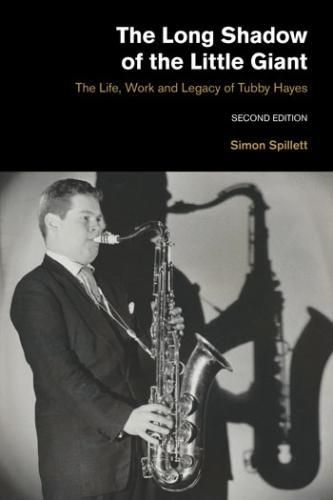Readings Newsletter
Become a Readings Member to make your shopping experience even easier.
Sign in or sign up for free!
You’re not far away from qualifying for FREE standard shipping within Australia
You’ve qualified for FREE standard shipping within Australia
The cart is loading…






This title is printed to order. This book may have been self-published. If so, we cannot guarantee the quality of the content. In the main most books will have gone through the editing process however some may not. We therefore suggest that you be aware of this before ordering this book. If in doubt check either the author or publisher’s details as we are unable to accept any returns unless they are faulty. Please contact us if you have any questions.
Over forty years have elapsed since the death of the British jazz legend Tubby Hayes and yet his story still continues to captivate. Beginning as a precociously talented teenage saxophonist, he took first the local and then the international jazz scene by storm, displaying gifts equal to the finest American jazzmen. He appeared with none other than Duke Ellington and proved almost single-handedly that British jazz need not labour under an inferiority complex. Hayes’s triumphs during the 1950s and 60s enabled still later generations of English musicians to take their music onto the world stage. However his story, distorted by the folklore surrounding his tragically early death, aged only 38, has rarely been accurately recorded. Much of what has been written, broadcast and recounted about Hayes has added only confusion to our understanding of his short but brilliant life.In this new, expanded paperback edition, award-winning saxophonist and writer Simon Spillett, widely regarded as the world’s leading authority on Hayes and his work, painstakingly outlines a career that alternated professional success and personal downfall. Using credible eye-witness recollection, drawn from conversations with Hayes’s family, partners, friends and musical colleagues, unique access to Hayes’s own tape, photographic and personal archives - including papers that have only recently come to light - and extensive contemporary research material, Spillett has reconstructed the trajectory of his subject’s life both candidly and respectfully.
$9.00 standard shipping within Australia
FREE standard shipping within Australia for orders over $100.00
Express & International shipping calculated at checkout
This title is printed to order. This book may have been self-published. If so, we cannot guarantee the quality of the content. In the main most books will have gone through the editing process however some may not. We therefore suggest that you be aware of this before ordering this book. If in doubt check either the author or publisher’s details as we are unable to accept any returns unless they are faulty. Please contact us if you have any questions.
Over forty years have elapsed since the death of the British jazz legend Tubby Hayes and yet his story still continues to captivate. Beginning as a precociously talented teenage saxophonist, he took first the local and then the international jazz scene by storm, displaying gifts equal to the finest American jazzmen. He appeared with none other than Duke Ellington and proved almost single-handedly that British jazz need not labour under an inferiority complex. Hayes’s triumphs during the 1950s and 60s enabled still later generations of English musicians to take their music onto the world stage. However his story, distorted by the folklore surrounding his tragically early death, aged only 38, has rarely been accurately recorded. Much of what has been written, broadcast and recounted about Hayes has added only confusion to our understanding of his short but brilliant life.In this new, expanded paperback edition, award-winning saxophonist and writer Simon Spillett, widely regarded as the world’s leading authority on Hayes and his work, painstakingly outlines a career that alternated professional success and personal downfall. Using credible eye-witness recollection, drawn from conversations with Hayes’s family, partners, friends and musical colleagues, unique access to Hayes’s own tape, photographic and personal archives - including papers that have only recently come to light - and extensive contemporary research material, Spillett has reconstructed the trajectory of his subject’s life both candidly and respectfully.